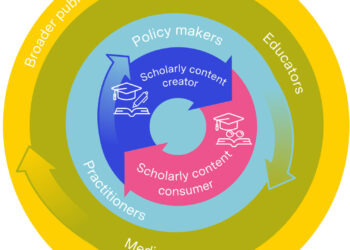In today’s Kitchen Essentials interview, we hear from Nici Pfeiffer, Chief Product Officer at the Center for Open Science (COS), a nonprofit organization whose mission is to increase openness, integrity, and reproducibility of research. COS’s Theory of Change recognizes that academic research is a social system, and that starting and scaling behavior change requires a systems-based intervention strategy. Their strategy, therefore, is to catalyze innovators and early adopters as the beachhead for change in a scholarly community by providing the tools needed for the new behaviors, including the Open Science Framework (OSF).
Please tell us a bit about yourself — your role at COS, how you got there, and why you embarked on a career in research infrastructure?
I started at COS about nine and a half years ago, actually as a part-time Quality Assurance intern. My background is as a Mechanical Engineer with Materials Science research experience, later applied as an Electronics Engineer for the US government in the Global War on Terrorism doing radar research. I then spent 12 years at home with my three children, and when I was ready to return to the workforce I found COS and was delighted by the opportunity to reverse-engineer software by attempting to break it and also to ease back into a career with part-time hours. Working with Brian Nosek and the rest of the COS team (COS was pretty small then) was inspiring and the COS mission was energizing, so I quickly joined full-time and haven’t looked back.
As I spent more time engaging with the software engineering team building the Open Science Framework (OSF), and with the communities signing up for accounts and using it for sharing research openly, I endeavored to build a tool that would support a diverse and global research community. As a researcher previously, I could empathize with the lack of transparency with the process of conducting research experiments, and with the need for tools that provided ease in collaboration and sharing. Over time, I began to shepherd the OSF as a product manager and build a team of dedicated product and engineering staff to maintain and develop OSF. About five years ago, I took on a new challenge at COS, to help support diversified revenue streams and the development of revenue models that will provide sustainability for OSF and COS.
So, while I did not set out with a career in research infrastructure in mind, the journey has filled me with passion and dedication for open scholarship as a means to advance knowledge and research sharing.
What do you like most and least about working in research infrastructure?
What I like both most and least is that the research system is vast, with many actors playing roles to advance open scholarship. This means that no one actor can steer the course of the enterprise, rather each plays a specific and important role; it is an interdependent system. It can feel overwhelming when thinking about change in those terms, but on the other hand, it can be so motivating when you see incremental change in communities.
Based on your own experience, what advice would you give someone starting, or thinking of starting, a career in research infrastructure?
I would say jump in! The more, the merrier, and we need fresh and unique perspectives on solving the challenges faced by diverse communities.
What sort of infrastructure does COS provide, and who are your users?
COS provides the OSF and a suite of interfaces for communities and stakeholders to aggregate and discover scholarship. OSF is a free, open-source project management and collaboration tool that supports researchers throughout the entire research lifecycle — from planning, to conducting, to reporting, to discovering research. OSF was introduced to the research community in 2012 as a platform to help implement open practices. Today, there are more than 700,000 registered users who have registered 145,000 projects, shared over 130,000 open access papers and preprints, and more than 10 million data files and other research content. In 2023, more than 3 million files were posted, translating to over 8,000 files daily; and there were more than 8 million unique visitors, who downloaded more than 50 million files. Built with a community of developers and researchers from across disciplines, OSF is part of a broader network of infrastructure services and community tools that support the needs of research communities in implementing open science practices, as well as being an instrumental part of the COS culture change strategy. It enables researchers to make their research open and accessible, with full transparency of their activity and improved rigor, by specifying their study design and analysis plan through pre-registration prior to data collection.
How is COS sustained financially?
COS receives continued support through grants from government and private funders, as well as donations and earned revenue through our Fee-for-Service offerings, which include OSF for Institutions. We are transparent about our operations and finances; you can learn more at https://www.cos.io/about/finances.
As a leader of a research infrastructure organization, what do you think are the biggest opportunities we’ve not yet realized as a community — and what’s stopping us?
The biggest opportunities that lay before us are the separation of peer review from the publication of scholarship, and more assessment tools to evaluate the quality, rigor, reproducibility, robustness, etc. of research outcomes. To realize these opportunities, we will need to embrace new business models for publication, how we reward and incentivize getting it right over getting it published, and putting research evaluation in the hands of the communities that practice it. Many small waves of progress are building toward the bigger wave of change, we just need to remove the barriers and be open-minded. The barriers most critical to address are the need for open review by research communities, and assessment tools that give feedback to researchers on: (1) the rigor or quality of their study design before they collect data, (2) the FAIRness of their data and outputs, and (3) the reproducibility or replicability of their study results. In addition, if we could embed in graduate and post-graduate programs more education on open scholarship practices and why they are good for science and good for researchers, along with training on how to implement them into the research practices, we would ready the next generation of researchers.
Looking at your own organization, what are you most proud of — and what keeps you awake at night?
At COS, I am most proud of the impact OSF has had in its 10 years of being a free tool for researchers to practice open science. Its flexibility means that it has really lived up to COS’s aspiration of giving the community a platform that could be adapted to support many diverse use cases and needs. There are a plethora of amazing exemplars of how individuals, teams, and entire communities have leveraged OSF to meet their needs, including: external tools that use the OSF’s API to automate data collection workflows and analysis; teams that translate OSF’s best practice guides into their language to support a new community of practice; new collaborations in new regions of the world; and other novel workflows that leverage OSF for sharing research outputs to extend their reach and impact.
What impact has/does/will AI have on COS’s work?
AI is a charged topic with many benefits and risks. COS is keenly interested in leveraging AI to support reducing redundant efforts like adding metadata to research outputs, suggesting keywords or ways to increase the discoverability of research outcomes, or even identifying other researchers doing similar investigations who may be good collaborators. All in hopes of freeing up researchers to spend more time on what they set out to do — research — and less on the burdensome administrative tasks of project management, organizing, collaborating, and disseminating their research.
What changes do you think we’ll see in terms of the overall research infrastructure over the next five to ten years, and how will they impact the kinds of roles you’ll be hiring for at COS?
In the next decade, I hope to see more policies coming out from the US government and other policy-makers that will bring open science practices into the everyday workflows of researchers. I also hope to see more sustainable funding and support in budgets to enable research infrastructure providers to continue to operate and support those policies with new tools and services that will help operationalize open science into the mainstream.
I think we will continue to see a rise in Data Science roles, AI Software Engineers, and data stewards to help with building tools and services, assessing the impact and reuse of research, and supporting researchers in sharing data and other outputs across the research lifecycle.


